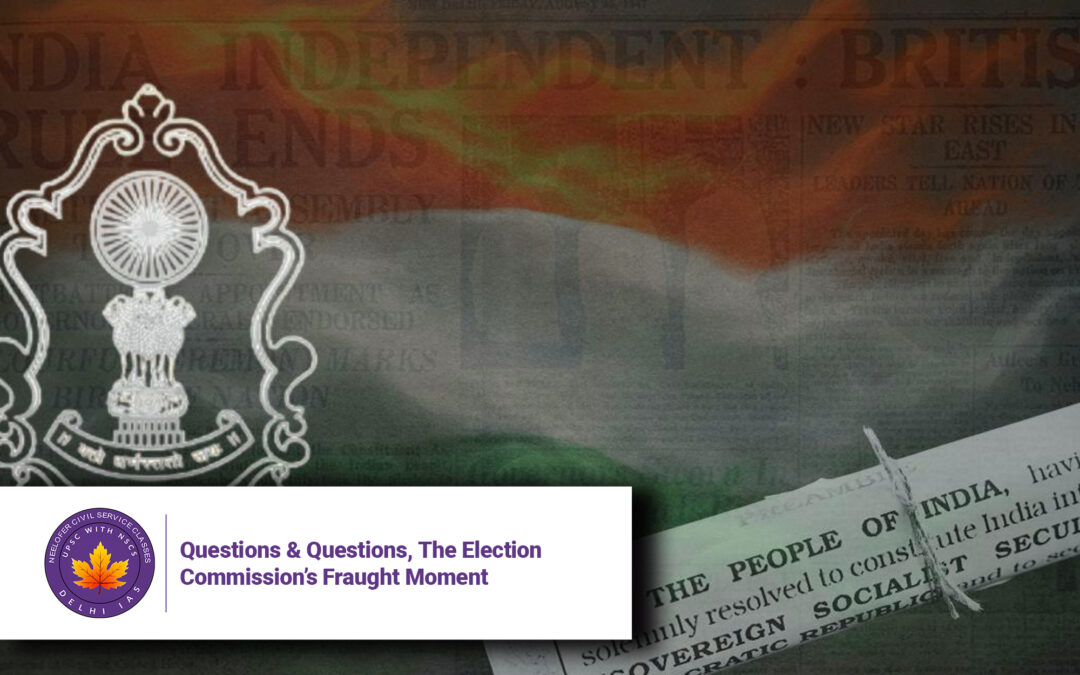Questions & Questions, The Election Commission’s Fraught Moment
Why in News?
The Election Commission of India (ECI), historically considered one of the most credible and trusted institutions in India, has found itself at the center of political controversy and public debate. The institution, which is tasked with safeguarding free and fair elections, is being accused of failing to live up to its reputation. Recent developments, including allegations of “vote chori” (vote theft) by the Opposition and controversies surrounding the Special Intensive Revision (SIR) of electoral rolls in Bihar, have put the EC under sharp scrutiny.
The issues became more prominent after Congress leader Rahul Gandhi accused the EC of collusion with the ruling Bharatiya Janata Party (BJP) in what he termed a “stolen election.” Simultaneously, the SIR in Bihar has sparked concerns of disenfranchisement, transparency lapses, and administrative arbitrariness. The EC’s defensive and sometimes combative responses have added to the perception of it being politically thin-skinned and less open to accountability.
Introduction
India’s democratic framework rests on several institutions, but none is as directly linked to the democratic process as the Election Commission. Since independence, the EC has played a central role in conducting elections that are both free and fair, building trust among citizens that their votes matter and their voice counts.
However, in recent times, the EC’s credibility has faced challenges. While the institution has historically managed to maintain neutrality in a highly polarized environment, its recent responses to criticism—marked by defensiveness and political adversarialism—have raised questions. At the heart of this debate are two key issues:
-
The accusation of “vote chori” raised by Opposition leader Rahul Gandhi.
-
The controversy over the Special Intensive Revision (SIR) of electoral rolls in Bihar, which has led to fears of disenfranchisement.
The EC, instead of calmly clarifying concerns, has been perceived as combative in its press interactions, at times ducking difficult questions. This article examines these developments, the implications for the EC’s credibility, and the way forward for the institution in India’s democracy.
The “Vote Chori” Allegations
Rahul Gandhi, Leader of the Opposition in the Lok Sabha, recently accused the EC of being complicit in what he described as “vote chori.” He alleged that elections had been “stolen” in states like Maharashtra and Karnataka, and that this trend would continue in Bihar unless checked.
This charge is deeply political, with Gandhi making the alleged “stolen election” the centerpiece of his campaign. His “Vote Adhikar Yatra,” a 16-day, 1,300 km march across Bihar, was launched with the aim of mobilizing voters against what he described as systematic electoral malpractice.
The EC, however, dismissed these claims as baseless. Chief Election Commissioner Rajiv Kumar pointed out that India’s electoral system involves multiple layers of checks and balances, making large-scale fraud almost impossible. Yet, the EC’s response was widely criticized as being shrill and adversarial, instead of calm and transparent.
The larger problem here is perception. In a democracy, institutions must not only be fair but also be seen to be fair. The EC’s defensive reaction risks undermining public trust, even if the allegations themselves are politically motivated.
The Controversy Over Bihar’s Electoral Rolls
The second and arguably more serious issue relates to the Special Intensive Revision (SIR) of electoral rolls in Bihar. The EC undertook this exercise to update and clean voter lists, but its execution has drawn criticism.
In previous revisions, the EC bore the burden of proof in verifying voter eligibility. However, in this SIR, the burden shifted to voters themselves, raising concerns that the process was more about exclusion than inclusion. Reports suggest that around 65 lakh names were deleted from draft rolls in the first phase, sparking fears of disenfranchisement.
The Supreme Court has since intervened, upholding the EC’s power to conduct such revisions but also nudging it towards greater transparency. For instance, electoral officers in Bihar’s 38 districts have reportedly been asked to consider a family tree as an informal “12th document” when voters are unable to produce one of the 11 official documents. This move, though improvised, offers some relief to voters scrambling to prove eligibility.
Transparency has become a key concern. The EC has since published reasons for deletions, but questions remain about the timing, design, and fairness of the SIR. In a democracy as vast as India’s, even the perception of disenfranchisement can damage institutional credibility.
EC’s Shrill Responses and Image Problem
The Election Commission recently held a press conference to address these issues. While it answered some questions, it ducked others and adopted an adversarial tone. This created the impression that the EC is politically thin-skinned and unable to handle criticism maturely.
This is problematic because the EC is not just another government office—it is a constitutional authority. Its strength lies in public confidence, not in its ability to silence critics. By responding in a defensive manner, the EC risks looking like any other political institution rather than the neutral arbiter it is meant to be.
Even the Supreme Court has, in past instances, reminded the EC of its responsibility to act with humility and transparency. By appearing combative, the EC has undermined its own credibility, regardless of whether the allegations against it hold ground.
Institutional Concerns and Transparency
The ongoing controversies highlight deeper institutional concerns:
-
Due Process: The EC must ensure that complaints about fraudulent voters or faulty rolls are dealt with through transparent procedures.
-
Voter Privacy: In its drive towards transparency, the EC must balance disclosure with the protection of voter data.
-
Checks and Balances: India’s layered electoral process is designed to prevent fraud, but the EC must communicate this better to the public.
-
Public Trust: The ultimate test for the EC is whether the public believes in its neutrality and fairness.
By publishing reasons for deletions and widening the range of acceptable documents for voter verification, the EC has taken small steps forward. However, it needs to do much more to rebuild trust.
Challenges and the Way Forward
The challenges facing the EC are as much about perception as reality. In a democracy, trust in institutions is paramount. Once that trust begins to erode, it becomes very difficult to rebuild.
Key Challenges:
-
Politicization of electoral disputes, with parties making the EC a target.
-
Logistical hurdles in managing a massive electoral roll across a diverse country.
-
Rising public skepticism about institutions in an age of polarized politics.
-
The EC’s own communication strategy, which has often worsened perceptions.
Way Forward:
-
Humility in Communication: The EC must answer every question calmly and transparently, without appearing adversarial.
-
Public Outreach: Greater use of technology, public notices, and grassroots campaigns can build trust in processes like the SIR.
-
Judicial Oversight: Continued guidance from the Supreme Court can help the EC maintain balance.
-
Institutional Strengthening: Parliament and civil society must work towards ensuring the EC remains independent and insulated from political influence.
Conclusion
The Election Commission stands at a critical juncture. It remains one of India’s most important institutions, but its credibility is under strain. Allegations of “vote chori,” coupled with controversies over voter roll revisions, have sparked widespread debate.
The EC’s task is twofold: to conduct free and fair elections, and to be seen as doing so. In this context, humility, transparency, and responsibility are more important than defensiveness. As India heads towards key state elections and eventually the general elections, the EC must rise above partisan allegations and reassert its role as the neutral guardian of democracy.
Q&A Section
Q1. Why has the Election Commission been in the news recently?
The EC has faced controversy over two major issues: accusations of “vote chori” by Opposition leader Rahul Gandhi and the Special Intensive Revision (SIR) of electoral rolls in Bihar, which has led to fears of voter disenfranchisement.
Q2. What are the main concerns with the SIR in Bihar?
The SIR shifted the burden of proof to voters, leading to fears of exclusion. Around 65 lakh names were deleted in the first phase, raising concerns about transparency and fairness.
Q3. How has the Supreme Court responded to the controversy?
The Supreme Court upheld the EC’s authority to carry out the revision but directed it to ensure greater transparency, nudging it to give reasons for deletions and consider additional documents for voter verification.
Q4. Why has the EC’s response been criticized?
The EC’s press conference was seen as combative and thin-skinned, with some questions ducked and others stonewalled. This created the perception that the EC was politically defensive rather than calmly authoritative.
Q5. What steps must the EC take to restore public trust?
The EC should focus on transparent communication, greater public outreach, humility in responses, and adherence to due process. Strengthening its independence and maintaining public confidence should be its highest priority.







